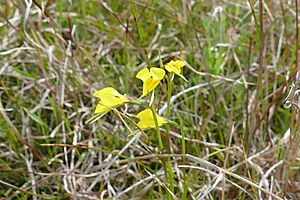Clumping golden moths facts for kids
Quick facts for kids Clumping golden moths |
|
|---|---|
 |
|
| Diuris gregaria in the southern Grampians | |
| Scientific classification | |
| Genus: |
Diuris
|
| Species: |
gregaria
|
The Diuris gregaria, commonly known as clumping golden moths, is a special type of orchid. It is found only in Victoria, Australia. This orchid usually grows in thick groups of up to thirty plants. Each plant has between three and seven leaves. It produces one or two bright yellow flowers. These flowers have a few dark stripes. The clumping golden moth orchid is quite rare. You can mostly find it in grasslands west of Melbourne.
Contents
About the Clumping Golden Moths Orchid
The Diuris gregaria is a plant that grows from a tuber (a swollen underground stem). It is a perennial herb, meaning it lives for more than two years. These orchids often grow very close together. You might see up to thirty plants in one dense clump.
Each plant has three to seven thin, grass-like leaves. These leaves are about 50 to 100 mm (2 to 4 inches) long. They are only 1 to 2 mm (0.04 to 0.08 inches) wide. The leaves form a loose, grassy clump.
One or two bright yellow flowers grow on a stem. This stem can be 100 to 200 mm (4 to 8 inches) tall. The flowers are about 12 to 20 mm (0.5 to 0.8 inches) wide. They have a few short, dark stripes.
The top part of the flower, called the dorsal sepal, is egg-shaped. It is held almost flat, measuring 7 to 12 mm (0.3 to 0.5 inches) long. The side sepals are green and shaped like a spear. They are 14 to 18 mm (0.6 to 0.7 inches) long. These sepals usually point downwards and stay parallel to each other.
The petals of the flower curve forward. They are 8 to 12 mm (0.3 to 0.5 inches) long. The most interesting part is the labellum, which is the orchid's "lip." It is 10 to 17 mm (0.4 to 0.7 inches) long and has three parts. The middle part is egg-shaped. The two side parts are smaller with uneven edges. There are also two dark yellow, bumpy ridges on the labellum. These orchids bloom in September and October.
How It Got Its Name
The Diuris gregaria was officially named in 2006. It was described by a botanist named David Jones. He found a sample of the plant near Derrinallum. The name gregaria comes from a Latin word. It means "belonging to a flock or herd." This name perfectly describes how these orchids grow in clumps, like a group of animals.
Where Clumping Golden Moths Live
Clumping golden moths grow in grasslands. They are found on the basalt plains in western Victoria, Australia. Basalt plains are flat areas formed by ancient lava flows.
Protecting This Orchid
This beautiful orchid is considered "endangered." This means it is at high risk of disappearing forever. It is protected under Victoria's Flora and Fauna Guarantee Act 1988. The main reason its numbers have dropped is due to farming and agriculture. These activities have reduced the natural grassland areas where the orchid grows. Efforts are being made to protect its remaining habitats.

